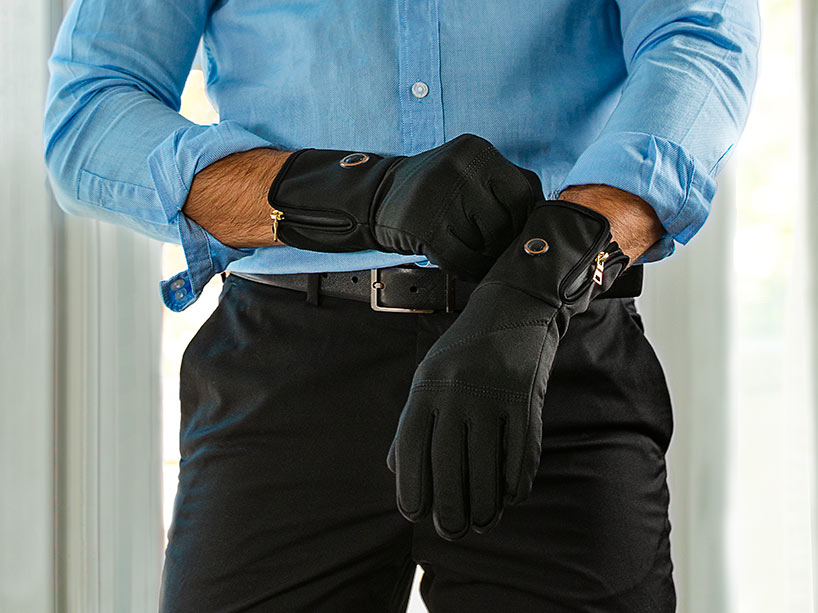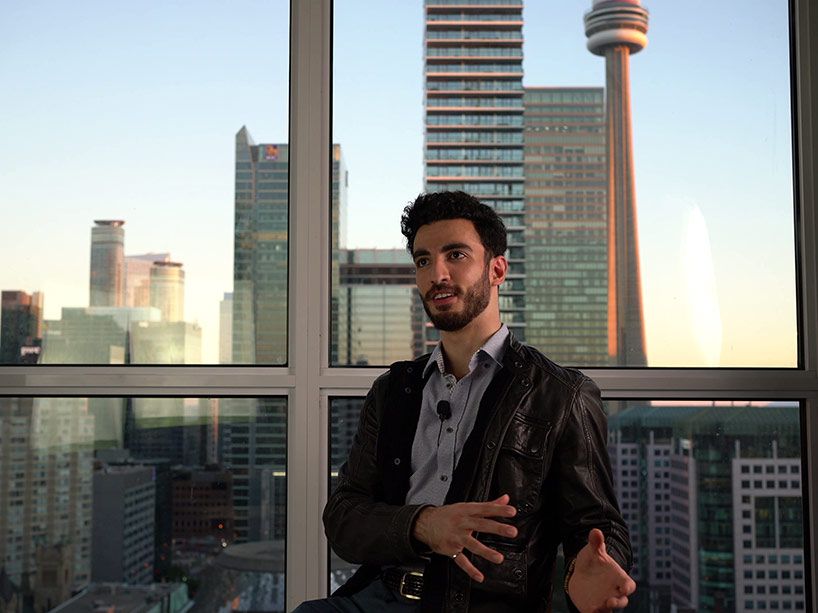Ryerson grad's Smart Gloves heating up hands - and the tech world

Adrien Beyk’s Smart Gloves are slim fitting, USB-C rechargeable and have a battery life of six hours. Photo courtesy of Adrien Beyk.
Growing up, Adrien Beyk remembers going to New Year’s Eve celebrations at Nathan Phillips Square with his family - and freezing.
“My hands would always be so cold,” said the 26-year-old Ryerson University engineering graduate. “I remember looking at the guy performing on stage and thinking, ‘How is this guy playing the piano right now?’”
Today, Beyk has a solution: heated gloves.
Called Smart Gloves, Beyk launched the winter wearables through his company, Quanta Vici (external link) , last fall. The startup was born out of Ryerson’s iBoost (external link) , an early stage technology incubator.
“Within two hours we hit our goal on Kickstarter, selling over $300,000 in 30 days,” he said. “It put us in the top 0.24 per cent on Kickstarter.”
Since then, Beyk has sold more than 1,800 pairs of Smart Gloves and heated socks (with combo packages a top seller), and has been heating up the tech world with features in Wired, Yahoo!Finance, Trendhunter, BlogTO (external link) and CTV News (external link) .
How they work
“The wearables are ‘smart’ in that they sense the temperature in your hands and feet and generate the exact amount of heat needed to keep your preferred temperature degree,” Beyk explained, noting that users can set the temperature as high as 55 degrees celsius.
“The gloves have hidden fibres distributed throughout the material that can sense the temperature in the glove, as well as a processor that helps regulate the heat,” he continued, adding that adjustments can be made manually on the glove itself, or through an app on a user’s smartphone.
The app can provide additional information such as how much battery time is left and the temperature sensed in the clothing. It also shows the user’s preferred temperature, which is saved in the settings.
The wearables have a battery life of six hours and are USB-C rechargeable, a popular feature, Beyk says, since it means they’re compatible with current laptops and smartphones. It’s those aspects that make the wearables a first on the market.
Customized technology
“Heated wearables have been around for decades, but people weren’t using them in their daily life, so I started researching how to make them more practical,” said Beyk, who began working on the invention in 2017.
He quickly learned that other heated gloves on the market lasted only two hours. Big batteries made them bulky and they were “a nightmare” to charge, he said. Heating was also an issue.
“For example, some warmed the fingers but not the thumb,” he said.
So Beyk improved each of those elements - creating his own customized technology with added temperature sensors.
“That way, you can say, for example, “I want ‘Low’ to be 26 degrees celsius, ‘Medium’ to be 44 degrees celsius and ‘High’ to be 50 degrees celsius,” he explained.
Beyk’s smaller battery means the gloves are slim fitting too - so users can complete a variety of tasks while wearing them - including, he said, playing a musical instrument such as at an outdoor New Year’s Eve event.

Adrien Beyk says Ryerson not only embraced and encouraged his creativity, but the “tough love” from mentors helped him grow as an entrepreneur. Photo: Adrien Beyk.
Gloves can help with medical conditions
Beyk says the gloves can help anyone who spends time in cold temperatures - from police officers and couriers, to students walking to class, and anyone waiting to catch the bus.
They can also help those with medical conditions who are negatively affected by cold weather. In fact, Beyk’s dad, who has poor circulation from diabetes, was often a guinea pig to test out his son’s heated socks, which are also part of Beyk’s product line.
“He would often ask if I was charging them behind his back, because the charge would last so long,” Beyk said with a laugh.
Another feature that was important to Beyk was ensuring the high-tech gloves were fashion-friendly - a feature often compromised by technology.
“I’m obsessed with being creative, and when it benefits others in their daily life, that’s where I get pleasure and what I was born to do,” he said.
Ryerson values creativity, entrepreneurship
It’s this opportunity to pursue his creative side that Beyk especially appreciated at Ryerson and at iBoost.
Just as he needs supportive friends who “won’t laugh at my crazy ideas”, he says he also needs an institution that will support his creativity.
“Ryerson is truly caring about new ideas, entrepreneurship and this type of work,” he said, noting that Tarek Sadek, director for the Centre of Engineering Innovation and Entrepreneurship (CEIE), which houses the iBoost Zone, and former CEIE director Rafik Loufty, have been key to his success.
“I would take my business plan to Tarek, and he would give me his feedback. I would get my fair share of tough love, and it would help me learn and figure things out,” he said.
Prestigious awards
Eventually, Beyk’s efforts led him to win two Norman Esch Engineering Innovation and Entrepreneurship Awards- a prestigious prize that comes with $8,000 (Stage 2) and $25,000 (Stage 3) to help Ryerson engineering students bring their ideas to life.
“It’s a really big deal for students that care about creativity and entrepreneurship, to see that where you’re studying values these things. Ryerson’s Esch Awards really do that... I couldn’t have made this happen without Esch,” he said, adding that he received the Stage 1 Esch award for his work in software development when he was 17, during his first year of studies at Ryerson.
Supported by the Norman Esch Foundation and administered by the Centre for Engineering Innovation and Entrepreneurship (CEIE), the three-stage Norman Esch Engineering Innovation and Entrepreneurship Awards offer a financial boost to Ryerson engineering and architectural science students with inventions, innovative technologies and startups. Since 2009, the foundation has given more than $3 million to support student entrepreneurship at FEAS, furthering the research, development and commercialization of ideas for more than 300 students and counting.
Beyk says he’s also grateful to have received $21,000 thanks to The Accessibility Project, a Ryerson award he received in 2018.
Determination pays off
“I am very proud of him,” Sadek says. “Not only of his startup success, but I am proud of his growth as a leader, entrepreneur and engineering graduate who will continue to use his learning and skills to create value in his community and the world.”
One of the things that stands out most to Sadek is Beyk’s perseverance.
“I will always remember when we had to meet many days in a row for long hours to meet the deadlines for the Esch awards program. His willingness to improve when he got rejected and his feeling of responsibility and accountability when he finally won the awards - this attitude, along with his ability to stay persistent but coachable, which is very hard, were the real signs that he will get somewhere, and he did.”
Andrea Matheson, DMZ’s entrepreneur in residence, agrees.
“Not everyone who comes to speak with me is ready for the focus and hard work that’s needed. Adrien was ready to listen and be coached to uncover the blindspots that all entrepreneurs have,” she said. “He leveraged the information to get his product to its destination sooner.”
‘Whole folder of ideas’
In terms of what’s next, while Quanta Vici has graduated from iBoost, Beyk will be continuing in a mentor capacity to help other young entrepreneurs.
He’s also giving back through social media - connecting with the tech community and sharing his findings and methods on Instagram (external link) and YouTube (external link) .
He plans to expand and enhance his products for next winter, while also looking at ways to lower the price point - at roughly $255 CAD per pair, he recognizes the price tag is steep for many potential consumers.
He’s also in discussions to bring Smart Gloves to Japan. And, noting that he created a photo editing app (external link) earlier in his career, he says, “Quanta Vici isn’t limited to wearables. I have a whole folder of ideas.”
Those interested in purchasing Smart Gloves or heated socks can shop online on the Quanta Vici website (external link) .
Applications are now open for the 2021 Esch Foundation Awards. Find out more at the awards website.
Related
